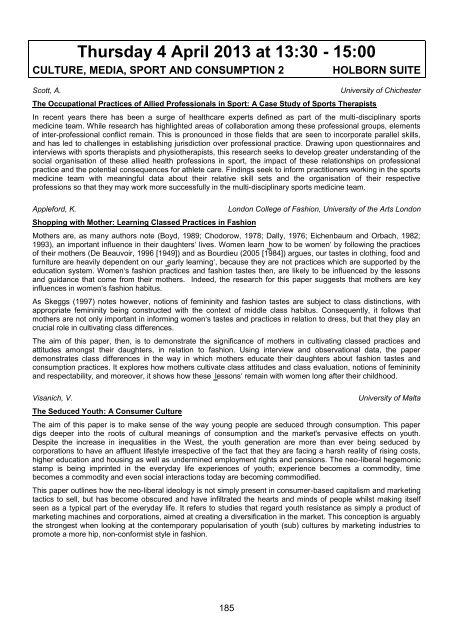Engaging Sociology
Engaging Sociology
Engaging Sociology
You also want an ePaper? Increase the reach of your titles
YUMPU automatically turns print PDFs into web optimized ePapers that Google loves.
Thursday 4 April 2013 at 13:30 - 15:00<br />
CULTURE, MEDIA, SPORT AND CONSUMPTION 2 HOLBORN SUITE<br />
Scott, A. University of Chichester<br />
The Occupational Practices of Allied Professionals in Sport: A Case Study of Sports Therapists<br />
In recent years there has been a surge of healthcare experts defined as part of the multi-disciplinary sports<br />
medicine team. While research has highlighted areas of collaboration among these professional groups, elements<br />
of inter-professional conflict remain. This is pronounced in those fields that are seen to incorporate parallel skills,<br />
and has led to challenges in establishing jurisdiction over professional practice. Drawing upon questionnaires and<br />
interviews with sports therapists and physiotherapists, this research seeks to develop greater understanding of the<br />
social organisation of these allied health professions in sport, the impact of these relationships on professional<br />
practice and the potential consequences for athlete care. Findings seek to inform practitioners working in the sports<br />
medicine team with meaningful data about their relative skill sets and the organisation of their respective<br />
professions so that they may work more successfully in the multi-disciplinary sports medicine team.<br />
Appleford, K. London College of Fashion, University of the Arts London<br />
Shopping with Mother: Learning Classed Practices in Fashion<br />
Mothers are, as many authors note (Boyd, 1989; Chodorow, 1978; Dally, 1976; Eichenbaum and Orbach, 1982;<br />
1993), an important influence in their daughters‘ lives. Women learn ‗how to be women‘ by following the practices<br />
of their mothers (De Beauvoir, 1996 [1949]) and as Bourdieu (2005 [1984]) argues, our tastes in clothing, food and<br />
furniture are heavily dependent on our ‗early learning‘, because they are not practices which are supported by the<br />
education system. Women‘s fashion practices and fashion tastes then, are likely to be influenced by the lessons<br />
and guidance that come from their mothers. Indeed, the research for this paper suggests that mothers are key<br />
influences in women‘s fashion habitus.<br />
As Skeggs (1997) notes however, notions of femininity and fashion tastes are subject to class distinctions, with<br />
appropriate femininity being constructed with the context of middle class habitus. Consequently, it follows that<br />
mothers are not only important in informing women‘s tastes and practices in relation to dress, but that they play an<br />
crucial role in cultivating class differences.<br />
The aim of this paper, then, is to demonstrate the significance of mothers in cultivating classed practices and<br />
attitudes amongst their daughters, in relation to fashion. Using interview and observational data, the paper<br />
demonstrates class differences in the way in which mothers educate their daughters about fashion tastes and<br />
consumption practices. It explores how mothers cultivate class attitudes and class evaluation, notions of femininity<br />
and respectability, and moreover, it shows how these ‗lessons‘ remain with women long after their childhood.<br />
Visanich, V. University of Malta<br />
The Seduced Youth: A Consumer Culture<br />
The aim of this paper is to make sense of the way young people are seduced through consumption. This paper<br />
digs deeper into the roots of cultural meanings of consumption and the market's pervasive effects on youth.<br />
Despite the increase in inequalities in the West, the youth generation are more than ever being seduced by<br />
corporations to have an affluent lifestyle irrespective of the fact that they are facing a harsh reality of rising costs,<br />
higher education and housing as well as undermined employment rights and pensions. The neo-liberal hegemonic<br />
stamp is being imprinted in the everyday life experiences of youth; experience becomes a commodity, time<br />
becomes a commodity and even social interactions today are becoming commodified.<br />
This paper outlines how the neo-liberal ideology is not simply present in consumer-based capitalism and marketing<br />
tactics to sell, but has become obscured and have infiltrated the hearts and minds of people whilst making itself<br />
seen as a typical part of the everyday life. It refers to studies that regard youth resistance as simply a product of<br />
marketing machines and corporations, aimed at creating a diversification in the market. This conception is arguably<br />
the strongest when looking at the contemporary popularisation of youth (sub) cultures by marketing industries to<br />
promote a more hip, non-conformist style in fashion.<br />
185


